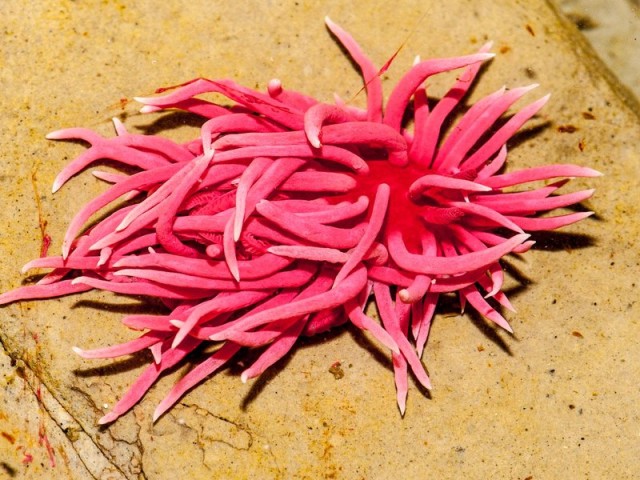According to researchers, warming ocean temperatures off the coast of northern California has triggered a population explosion of bright pink, inch-long sea slugs in tide pools along the state’s central and northern coastline.
Ocean temperatures have been steadily increasing due to global warming that is caused by climate change. Climate change might be destroying corals with ocean acidification and forcing dolphins to change their range, but some species are actually benefiting from it, namely the Hopkins’ Rose nudibranch (Okenia rosacea) .
The Hopkins’ Rose nudibranch (Okenia rosacea) is common to Southern California but found only sporadically in Central California and rarely north of San Francisco. However, in the past few weeks, researchers from UC Santa Barbara, UC Santa Cruz, the Bodega Marine Laboratory and the California Academy of Sciences have reported large number of these sea slugs in tide pools from San Luis Obispo to Humboldt counties. These are the highest numbers and northernmost records of this species seen since the strong El Ninos of 1998 and 1983.
John Pearse, professor emeritus of ecology and evolutionary biology at UC Santa Cruz, and the lead author of the study, “We haven’t seen anything like it in years. These nudibranchs are mainly southern species, and they have been all but absent for more than a decade. What makes this event especially exciting for us is that in 2011 we published a paper in which we predicted that oceanographic conditions like we are now experiencing would be marked by heavy recruitment of these and other nudibranchs. It’s just wonderful to see the prediction coming true.”
The researchers have added that the population explosion of sea slugs along the Californian coast in September last year was likely the result of warming oceans. The researchers have been studying the soft-bodied marine mollusks for a long time now. They stated that the warming water off the California coast is causing the nudibranchs’ to move northward, and it’s all part of the changing climate observed for decades by scientists around the world.
Researchers added that the sea slugs, which are fast growing and live for less than a year, a good indicator of sudden changes in ocean conditions.




